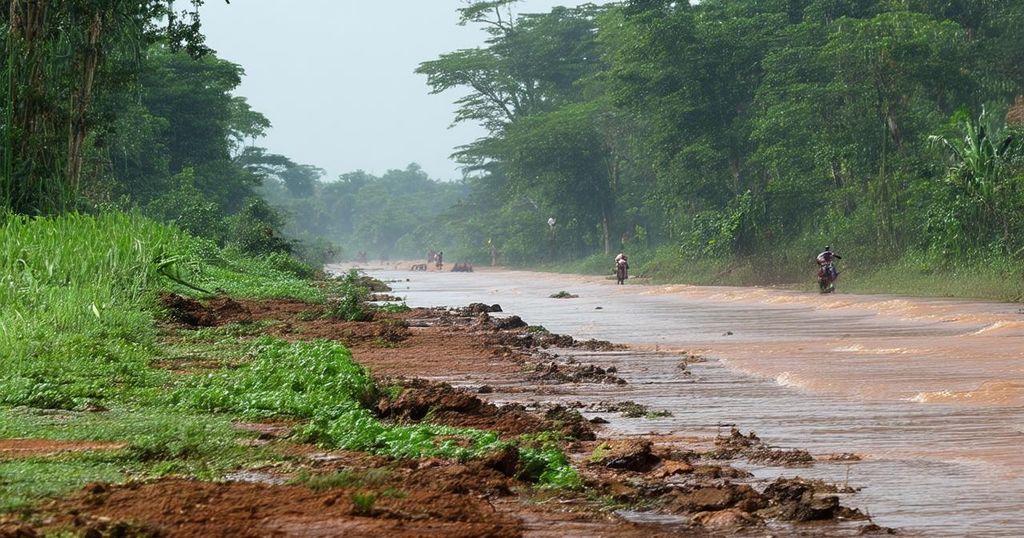The Central African Republic (CAR) faces a dire cycle of underdevelopment, political fragility, and climate change, as described in the CCDR. With one of the lowest GDP per capita, pervasive poverty, and significant reliance on vulnerable agricultural sectors, CAR is severely hampered by governance issues stemming from recurring conflicts and environmental threats. There is an urgent need for a comprehensive strategy that addresses these interconnected challenges to foster resilience and sustainable development.
The Central African Republic (CAR) is entangled in a destructive cycle marked by underdevelopment, state fragility, and climate change vulnerabilities, as highlighted in the Central African Republic Climate and Development Report (CCDR). This phenomenon is not merely theoretical; it reflects a real struggle supported by significant data revealing the deep-rooted challenges CAR confronts. Economically, CAR suffers from stark underdevelopment, manifesting in one of the lowest GDP per capita worldwide, recorded at a mere $495 in 2019. The Human Development Index (HDI) further underscores CAR’s challenges, ranking it among the lowest globally, indicative of profound deficits in health, education, and living standards. A child born in CAR today is anticipated to achieve only 29% of their productive potential, assuming they receive comprehensive education and health services. The disproportionate prevalence of poverty, with around 70% of the population living beneath the poverty line, exacerbates the situation. Between 2018 and 2021, a staggering 90% of households experienced significant shocks, primarily due to armed conflict (54%) and climate-related events (27%). Politically, CAR’s situation is worsened by a legacy of unrest and conflicts leading to weakened governance structures and disrupted social cohesion. Since gaining independence in 1960, the nation has endured repeated violence and political instability, severely compromising its governance capacities. This volatility often triggers societal tensions, which can escalate into violence, displacing large numbers of people and fracturing communities. Additionally, urban centers are growing inadequately, failing to provide resilient, inclusive environments for their populations. From an environmental perspective, a significant proportion—over 80%—of CAR’s populace is reliant on agriculture and forestry, sectors especially vulnerable to climatic changes. The CCDR emphasizes that changes in rainfall patterns, coupled with increases in extreme weather occurrences, endanger both water and food security, as well as livelihoods. Reports detail the disruptions caused by erratic rainfall, which exacerbate food insecurity and negatively impact the overall national economy. Furthermore, CAR’s vast river systems and lush forests are at risk from changing climatic conditions and desertification, jeopardizing essential natural resources. These issues are not isolated; they form an interconnected framework that perpetuates economic, social, and environmental stagnation. The nexus between underdevelopment, political instability, and climate vulnerability restricts CAR’s ability to execute effective climate resilience and adaptation strategies. Governance shortcomings also hinder robust policy application and necessary international collaborations. To disrupt this adverse cycle, it is crucial for CAR to pursue a comprehensive strategy that tackles both the underlying causes and symptoms of its challenges. This can be achieved through strategic investments, institution strengthening, and innovative policy reforms. Without a holistic and integrated approach that accounts for sectoral issues and spatial dynamics, CAR risks further entrenchment in this cycle, which would bear dire consequences for its populations’ wellbeing and future developmental opportunities.
The topic addresses the intersection of climate change, development, and governance in the Central African Republic, a country grappling with severe economic, political, and environmental challenges. The CCDR highlights these interconnected issues and serves as a foundational document for understanding CAR’s complex landscape. By focusing on the real and present dangers posed by underdevelopment and climate vulnerabilities, the report aims to provide a framework for actionable solutions that seek to foster resilience and sustainable growth in CAR. Key elements such as the economy, governance, and environmental stability are discussed in detail, painting a comprehensive picture of the nation’s plight and the urgent need for reform and international support.
The Central African Republic stands at a critical juncture, confronted by a multifaceted crisis rooted in underdevelopment, fragility, and climate change. The profound economic challenges, political instability, and environmental vulnerabilities are intricately intertwined, necessitating a sophisticated, multifaceted response. By prioritizing strategic investments and robust policies that address these fundamental issues, CAR could pave the way towards a resilient future, breaking free from the vicious cycle that has long plagued its development trajectory.
Original Source: reliefweb.int






